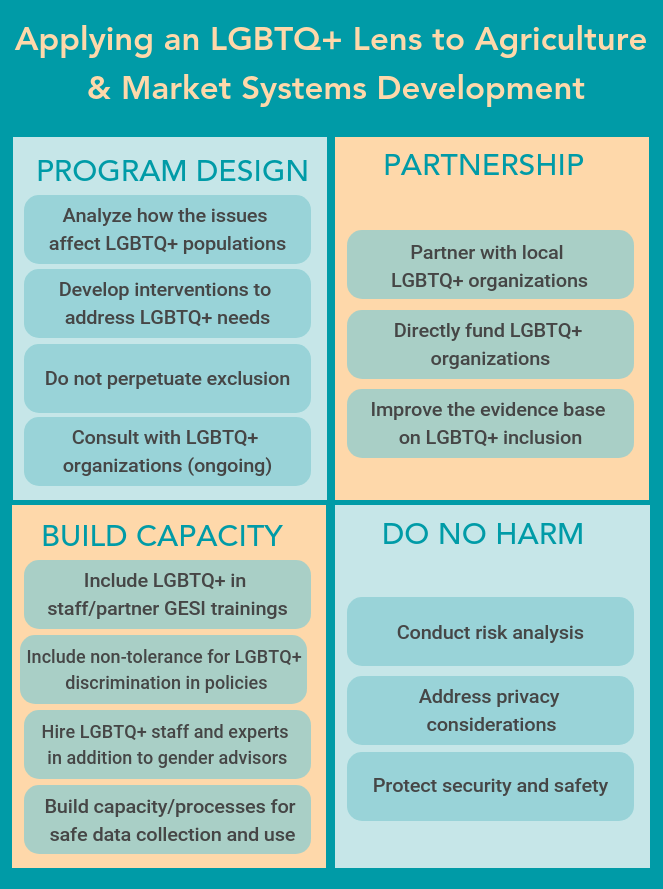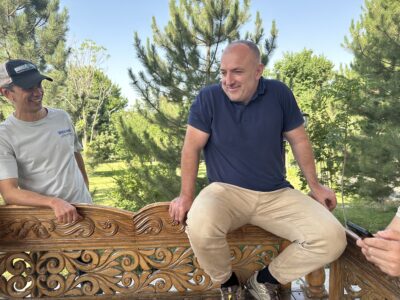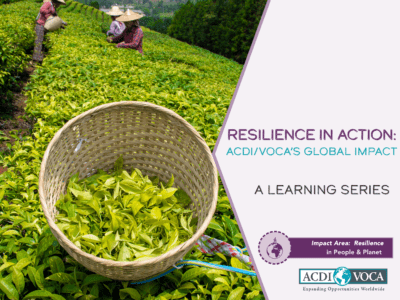
This June marks Pride Month, a celebration of the advancement of Lesbian, Gay, Bisexual, Transgender, and Queer (LGBTQ+) rights and opportunities. At ACDI/VOCA, we are proud to celebrate Pride and equality for people of all gender identities and orientations. Though there is still much work to be done, we aim to support the greater inclusion of LGBTQ+ populations through agriculture and market systems development (MSD) programs that we implement around the world. As vice president of gender and social inclusion at ACDI/VOCA, I reflect this month on the economic and social benefits of including LGBTQ+ groups and their impact on global development.
In part one of this blog series, we explored why the inclusion of LGBTQ+ populations matters, and we shared some of the challenges that make it hard to know where to begin when considering how to boost inclusion.
Five Considerations for Engaging LGBTQ+ Populations in Agriculture and MSD Programs
1. Safe and effective data collection is an essential first step. This means not just identifying and monitoring the LGBTQ+ individuals in a target population (though disaggregated data is essential), but also analyzing how systemic issues and norms affect these individuals and their ability to participate in markets and benefit from them. In line with the Women’s Economic Empowerment Framework for Inclusive Market Systems, it is equally important to understand access and agency for LGBTQ+ persons in an agriculture or market system by assessing the social norms, rules, and structures in which individuals and market actors interact and how they affect access to resources and opportunities, decision-making power, safety, and other key elements. This data collection should also deepen understanding of the diverse and differentiated experiences within the LGBTQ+ community, which is impacted by social norms and structures.

Implementers can collect this data through targeted studies as part of program design or start-up, such as gender and social inclusion analysis. This information can also be collected through other studies routinely conducted in these types of programs, such as inclusive value chain assessments, market actor/private sector landscape assessments, labor studies, food environment analyses, living income benchmark studies, financial landscape assessments, social network analyses, and more. When doing so, it is essential to work with technical experts, local partners, and stakeholders to ensure that the data is being collected safely, securely, ethically, and with attention to “do no harm” and risk considerations for both the study participants and implementers.
2. Incorporate intentional, transformative approaches to LGBTQ+ inclusion that are based on evidence and relate to the program’s agriculture and market systems objectives. If a program has developed a clear understanding of not just what LGBTQ+ populations need but also the wider norms and rules that dictate attitudes and behaviors perpetuated within the agriculture, market, or supporting systems, it is possible to identify places in the system that can translate to broader social and cultural change.
It will be important to identify a framework and develop a strategy for showing how LGBTQ+ groups are part of the system that a program is strengthening — engaging them is not an add-on, siloed activity that is disconnected from the core purpose of the program; it is a catalyst in creating a more inclusive, sustainable, and resilient system.
As part of this process, implementers should also analyze how their programs could affect LGBTQ+ communities and ensure that the scope or interventions of the program do not unintentionally perpetuate exclusion. This process requires reflecting on and potentially redefining how a program understands who the actors are in an agriculture or market system. For example, does the operational definition of a household or business include normative assumptions about gender, family composition, or relationships? If LGBTQ+ populations are lacking access to a service or resource, can the program make a business case for reaching and engaging them to a market actor who may not have seen this opportunity previously?
3. Develop strategic partnerships with LGBTQ+ organizations and others that can promote LGBTQ+ inclusion in agriculture and market systems. It is important to engage with LGBTQ+ organizations, provide them direct support and funding, and link them with other organizations. It is also important for implementers to think about inclusive market systems partnering more broadly and to expect more from our partners, as they are often important and powerful influences on environments and systems. As implementers, we can guide and support our partners to do things in new, more inclusive ways, whether through powerful co-creation processes, requirements in grant agreements, tailored technical assistance and capacity building, or linking private sector partners to local LGBTQ+ organizations for specific needs and activities.
There are several tools for identifying MSD partners that can be used to assess a portfolio of actors who may be able and willing to engage non-traditional actors in LGBTQ+ inclusion work. For example, using a will-skill matrix, an implementer may identify a private sector partner that has high skill but low willingness to promote LGBTQ+ inclusion. An MSD implementer could develop a custom approach to build this partner’s awareness of how greater inclusion of LGBTQ+ groups can improve their business performance. If this partner is a lead firm and adopts inclusive business practices, their activities and success can catalyze demonstration effects or crowding in and copying from other market actors.
4. Proactively build staff, partner, and stakeholder capacity to ensure they understand values on LGBTQ+ inclusion and equality. Capacity building should focus not only on maintaining safe workplaces by preventing discrimination and harassment but also on increasing awareness of why LGBTQ+ inclusion in the program matters. Implementers should access technical support related to LGBTQ+ inclusion, which means not just assuming, for example, that a single gender advisor can cover all gender-related topics. To follow through on this commitment, it will be important to identify and engage experts, such as full-time staff, partners, or consultants, who can provide guidance. Further, programs should recruit LGBTQ+ staff to work in a supportive and inclusive environment that respects all people.
In addition to the standard methods, programs may identify innovative ways to access technical expertise and build capacity that are a great fit for agriculture and market systems activities and approaches. For example, projects may develop inclusion-focused steering committees or expert groups to help validate strategies and participate in Collaborating, Learning and Adapting activities to inform learning and approaches. The USAID-funded Program of Alliances for Reconciliation, implemented by ACDI/VOCA in Colombia, developed a network of “reconciliation ambassadors,” many of whom represented LGBTQ+ groups. These ambassadors provided information to the program and served as the face of the program in local communities, delivering messaging and serving as champions.
5. Customize “do no harm” approaches for the unique needs of the LGBTQ+ community in the agriculture and market systems context. Remember that doing nothing is not the same as doing no harm. As part of data collection, implementers should conduct a robust risk assessment to ensure that planned activities do not inadvertently harm LGBTQ+ communities. Agriculture and MSD programs often operate in public environments where it can be difficult or dangerous to identify individuals who are members of sexual and gender minority groups. These challenges mean that implementers should develop rigorous protocols to protect this information in addition to partnering with local organizations and technical experts to design methods for accessing this information safely. Further, implementers should consider the specific and differentiated risks LGBTQ+ persons face in rural and agriculture settings, in markets and workplaces, on social media and online, and in proposed activities.
Depending on the program goals and the specific context, programs may need more robust safeguarding plans to address identified risks. Make sure that organizational and project documents include “do no harm” and safeguarding commitments and guidelines and consider incorporating these requirements into partnership agreements to ensure accountability on multiple levels. Expectations about LGBTQ+ inclusion and commitments to their safety should be clear from the beginning to all staff and partners. Consider incorporating participatory processes for feedback from LGBTQ+ communities to identify and be able to respond to unexpected outcomes, both positive and negative.
How do we get started with the first step?
Check out part three of this blog series, in which we discuss challenges, opportunities, and promising practices for collecting LGBTQ+ data. Also, don’t miss Why the Inclusion of LGBTQ+ Populations in Agriculture and Market Systems Matters, Part 1, and Experts Discuss Opportunities for Expanding LGBTQ+ Inclusion in Agriculture and Market Systems Development.
Comments






